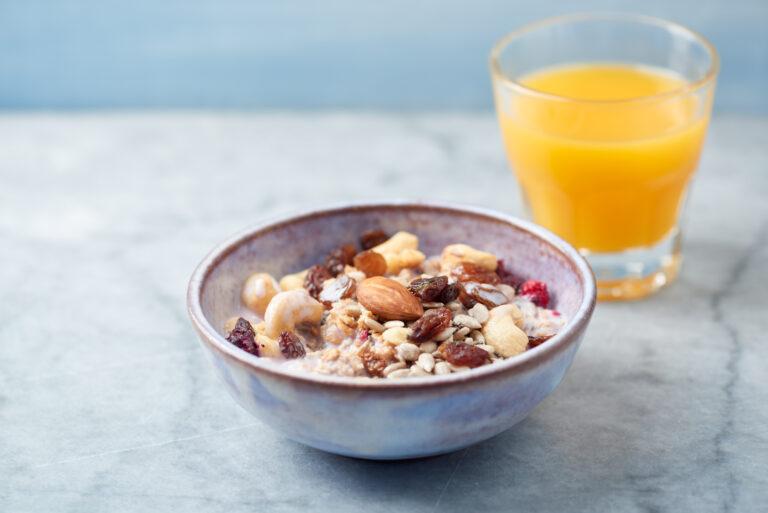Muesli is a product with a variety of compositions, including fiber, vitamins, minerals, amino acids and many other useful ingredients. Its usefulness lies in the fact that it usually contains whole grains, which contributes to its high nutritional value. Muesli is rich in vitamins B and E, as well as iron, magnesium and calcium. Fiber slows down digestion, which results in satiety, stimulates bowel movement, and inhibits the absorption of fats. Oat bran contains beta-glucan, which can lower cholesterol levels by up to 10%. The balance of simple and complex carbohydrates prevents fluctuations in blood sugar levels.
As usually recommended for all kinds of foods, whole seeds and muesli should be consumed moderately. The beneficial effects of muesli can be enjoyed if its composition is natural and balanced. Store-bought muesli may contain, for example, honey, coconut flakes, chocolate, or exotic fruits for flavoring. It is desirable that the sweet taste of the muesli is given only by the dried fruits. Exotic fruits in muesli could be treated with sulfur-containing preservatives, which can cause problems for sensitive consumers.
Seeds also represent a significant source of food-borne contaminants, the most important of which are mycotoxins (aflatoxin B1, ochratoxin A, fumonisin B1, deoxynivalenol, zearalenone), toxic metals (arsenic, cadmium, lead) and acrylamide from processing. Whole seeds usually contain more contaminants than refined products. The contaminant content of the seeds is largely of environmental origin, e.g. it may come from air, dust, soil, water, insects, rodents and other animals, or during storage and transport, or from processing equipment. Mycotoxins can cause acute poisoning or, in chronic cases, irreversible symptoms as a result of long-term intake. Their intake in any amount is undesirable for the human body. The amount of metabolites found in the urine may be a good indicator of long-term exposure. An Austrian survey examined contaminants and metabolites in the urine of 85 children. Of the 30 mycotoxins and metabolites tested, 8 were detected in the urine (deoxynivalenol in highest levels).
A Czech study looked at the mycotoxin content of oat flakes, a popular ingredient in muesli, and found mycotoxins from Fusarium, Alternaria, Aspergillus and/or Penicillium. 16 different toxins were detected in the 20 products tested.
In 2017, researchers at the University of Michigan reported the aflatoxin content of sunflower seeds. Consumption of sunflower seeds is recommended due to the positive effects of vitamin E against inflammation and free radicals. Aflatoxin contamination in certain crops is already well known, but this study was one of the first to report contamination of sunflower seeds.
Whole seeds, however, contain more nutrients that can even reduce the effects of contaminants. Some research suggests that the vitamin, mineral, and fiber content of seeds may have a potential protective effect against mycotoxins and especially toxic metals.
The consumer can also take action to reduce the intake of contaminants from consuming whole seeds, e.g. by observing general hygiene rules and monitoring the expiration date of products to reduce the likelihood of consuming a poorly stored, moldy product.
A variety of healthy, nutrient-rich foods, e.g. following a diet that includes both whole seeds and probiotics may contribute to the reduction of risks. The risks from the contaminant content of whole seeds do not outweigh their known nutritional benefits, but their immoderate consumption is still not recommended.

